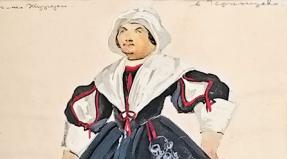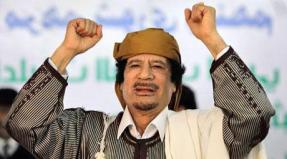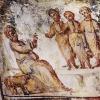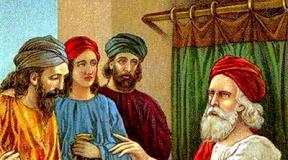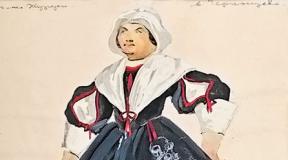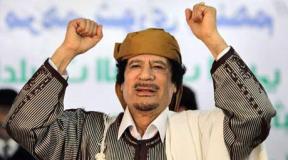Libyan Jamahiriya. Green Socialism. Civil and related branches of law
September 1 marks the 40th anniversary of the overthrow of royal power and the proclamation of the Libyan Arab Republic, which on March 2, 1977 was renamed the Socialist People's Libyan Arab Jamahiriya.
Libya, officially the Great Socialist People's Libyan Arab Jamahiriya, is an Arab state located in northern Africa. It borders with Algeria and Tunisia in the west, Sudan, Chad and Niger in the south, and Egypt in the east. In the north it is washed by the waters of the Mediterranean Sea.
Territory- 1.76 million sq. km (85% is desert). The total length of the country's Mediterranean coast is 1860 km.
Capital- Tripoli.
Big cities- Benghazi, Tobruk, Misurata.
Administrative division: Libya is divided into 26 administrative units - shaabi (provinces), which in turn are divided into communes (mahallas).
Population- 6.156 million people (2007 estimate), city residents - 77.4%.
The main peoples are Arabs 90% (with Libyan Arabs 33%, Cyrenaic Arabs 27%, Egyptian Arabs 10%, Palestinian Arabs 1% of the total population of the country); Arabic-speaking Berbers 4.4%; Nafusi-speaking Berbers 2.7%, Bedouins 1.5%, Punjabis 1%, Domari gypsies 0.6%, Italians 0.4%, Serbs 0.4%, Tuaregs 0.2%.
Official language- Arabic.
State religion- Sunni Islam, the basis of legislation is Sharia.
Story. Until 1911, Libya was part of the Ottoman Empire, from 1911 to 1942 it was an Italian colony, and in 1943, as a result of the defeat of the Italo-German coalition forces, it was occupied by England and France.
On December 24, 1951, in accordance with the UN General Assembly resolution (1949), Libya was proclaimed an independent sovereign state - the United Kingdom of Libya, led by King Idris I.
On September 1, 1969, a group of nationalist officers of the Libyan army led by Muammar Gaddafi, members of the Free Unionist Socialist Officers Movement, overthrew the monarchical regime and proclaimed the Libyan Arab Republic (LAR). In March 1977, the “Declaration on the Establishment of People's Power” was adopted, announcing the creation of a “jamahiriyya” (state of the masses) in the country.
State structure. Determined by the provisions of the “third world theory” of Muammar Gaddafi. Its essence lies in the implementation of the principle of “direct democracy”, i.e. direct participation of the people in governing the country without such institutions as the president, parliament, government and parties, which were officially abolished in the SNLAD.
Head of State- Muammar Gaddafi. Formally, he does not hold government positions, remaining only the Supreme Commander-in-Chief of the Armed People's Forces (SNLAD Armed Forces). Its legal status is determined by the Charter of Revolutionary Legality (approved at an emergency session of the Supreme People's Congress in March 1990), according to which Muammar Gaddafi is the “leader of the revolution” and “the source of revolutionary legality.”
Functions of government is carried out by the Supreme People's Committee (SPC), headed by a secretary, and by the ministries - by the Main People's Committees (GPC), which includes representatives of local people's committees responsible for this industry at the commune level.
Legislature. The General People's Congress (GPC), which meets once a year. The permanent body of the VNK is the General Secretariat.
Economy. In terms of proven oil reserves (estimated at 39.1 billion barrels), Libya ranks 1st in Africa and 5th among OPEC members (after Saudi Arabia, Iraq, Kuwait and the UAE). There are large reserves of natural gas (1.43 trillion cubic meters, 3rd place in Africa).
The leading sectors of the economy are oil and gas production, oil and gas refining and petrochemical industries, which account for 95% of export earnings. Light industry is represented mainly by small enterprises producing fabrics, sewing clothes and shoes, and tanning leather. The food industry is relatively underdeveloped.
In terms of per capita income (more than 6 thousand dollars per year), Libya ranks one of the first places in Africa.
International trade. Libya's leading foreign trade partners: Italy, Germany, USA and Spain. Foreign trade turnover in 2008 amounted to $89.9 billion (exports - $69.3 billion). The basis of exports is oil, petroleum products and petrochemicals. The main import items are passenger cars, machine tools, oil equipment, pipes, electrical equipment, lumber and other building materials, industrial and food products, various finished products, as well as chemicals and raw materials.
Foreign policy. Libya is a member of most major international organizations - the UN, the League of Arab States (LAS), the African Union, the Organization of the Islamic Conference (OIC), and the Non-Aligned Movement (NAM). Libya is the chairman of the Arab Maghreb Union and a member of the Community of Sahara-Sahel States, which it patronizes.
In July 2004, the WTO decided to begin formal negotiations on Libya's accession to it.
The material was prepared based on information from open sources
September 1 marks the 40th anniversary of the overthrow of royal power and the proclamation of the Libyan Arab Republic, which on March 2, 1977 was renamed the Socialist People's Libyan Arab Jamahiriya.
Libya, officially the Great Socialist People's Libyan Arab Jamahiriya, is an Arab state located in northern Africa. It borders with Algeria and Tunisia in the west, Sudan, Chad and Niger in the south, and Egypt in the east. In the north it is washed by the waters of the Mediterranean Sea.
Territory- 1.76 million sq. km (85% is desert). The total length of the country's Mediterranean coast is 1860 km.
Capital- Tripoli.
Big cities- Benghazi, Tobruk, Misurata.
Administrative division: Libya is divided into 26 administrative units - shaabi (provinces), which in turn are divided into communes (mahallas).
Population- 6.156 million people (2007 estimate), city residents - 77.4%.
The main peoples are Arabs 90% (with Libyan Arabs 33%, Cyrenaic Arabs 27%, Egyptian Arabs 10%, Palestinian Arabs 1% of the total population of the country); Arabic-speaking Berbers 4.4%; Nafusi-speaking Berbers 2.7%, Bedouins 1.5%, Punjabis 1%, Domari gypsies 0.6%, Italians 0.4%, Serbs 0.4%, Tuaregs 0.2%.
Official language- Arabic.
State religion- Sunni Islam, the basis of legislation is Sharia.
Story. Until 1911, Libya was part of the Ottoman Empire, from 1911 to 1942 it was an Italian colony, and in 1943, as a result of the defeat of the Italo-German coalition forces, it was occupied by England and France.
On December 24, 1951, in accordance with the UN General Assembly resolution (1949), Libya was proclaimed an independent sovereign state - the United Kingdom of Libya, led by King Idris I.
On September 1, 1969, a group of nationalist officers of the Libyan army led by Muammar Gaddafi, members of the Free Unionist Socialist Officers Movement, overthrew the monarchical regime and proclaimed the Libyan Arab Republic (LAR). In March 1977, the “Declaration on the Establishment of People's Power” was adopted, announcing the creation of a “jamahiriyya” (state of the masses) in the country.
State structure. Determined by the provisions of the “third world theory” of Muammar Gaddafi. Its essence lies in the implementation of the principle of “direct democracy”, i.e. direct participation of the people in governing the country without such institutions as the president, parliament, government and parties, which were officially abolished in the SNLAD.
Head of State- Muammar Gaddafi. Formally, he does not hold government positions, remaining only the Supreme Commander-in-Chief of the Armed People's Forces (SNLAD Armed Forces). Its legal status is determined by the Charter of Revolutionary Legality (approved at an emergency session of the Supreme People's Congress in March 1990), according to which Muammar Gaddafi is the “leader of the revolution” and “the source of revolutionary legality.”
Functions of government is carried out by the Supreme People's Committee (SPC), headed by a secretary, and by the ministries - by the Main People's Committees (GPC), which includes representatives of local people's committees responsible for this industry at the commune level.
Legislature. The General People's Congress (GPC), which meets once a year. The permanent body of the VNK is the General Secretariat.
Economy. In terms of proven oil reserves (estimated at 39.1 billion barrels), Libya ranks 1st in Africa and 5th among OPEC members (after Saudi Arabia, Iraq, Kuwait and the UAE). There are large reserves of natural gas (1.43 trillion cubic meters, 3rd place in Africa).
The leading sectors of the economy are oil and gas production, oil and gas refining and petrochemical industries, which account for 95% of export earnings. Light industry is represented mainly by small enterprises producing fabrics, sewing clothes and shoes, and tanning leather. The food industry is relatively underdeveloped.
In terms of per capita income (more than 6 thousand dollars per year), Libya ranks one of the first places in Africa.
International trade. Libya's leading foreign trade partners: Italy, Germany, USA and Spain. Foreign trade turnover in 2008 amounted to $89.9 billion (exports - $69.3 billion). The basis of exports is oil, petroleum products and petrochemicals. The main import items are passenger cars, machine tools, oil equipment, pipes, electrical equipment, lumber and other building materials, industrial and food products, various finished products, as well as chemicals and raw materials.
Foreign policy. Libya is a member of most major international organizations - the UN, the League of Arab States (LAS), the African Union, the Organization of the Islamic Conference (OIC), and the Non-Aligned Movement (NAM). Libya is the chairman of the Arab Maghreb Union and a member of the Community of Sahara-Sahel States, which it patronizes.
In July 2004, the WTO decided to begin formal negotiations on Libya's accession to it.
The material was prepared based on information from open sources
A significant date is approaching, which relates to all of us!
35 years ago, on March 2, 1977, the Socialist People's Libyan Arab Jamahiriya was proclaimed in Libya!
Even earlier, I heard that the Libyan Jamahiriya is something cooler than communism, and we are silent about life in this country, about the ideology of the Jamahiriya. But, to my shame, I was somehow not inspired to study this phenomenon in the life of mankind.
In connection with recent events, I will try to discover this phenomenon for myself and will publish information about it on this site. I also ask other participants to share information.
Let's start with the simplest thing - open Wikipedia.
Jamahiriya(Arabic: جماهيرية) - a form of social (some experts believe that state) structure, different from a monarchy and a republic, substantiated in the Third World Theory of Muammar Gaddafi and set out in the first part of the Green Book.
Jamahiriya- this is the highest form of democracy, in which power directly belongs to the people, direct democracy is exercised.
The word “jamahiriya” is a neologism formed by replacing the root word “jumhuriya” (republic) with the singular “jumhur” (people) with the plural “jamahir” (the masses). S. Gafurov pointed out: “It is interesting to note that the semantics of the word “Jamahiriya” is associated with concepts that Kropotkin considered early forms of anarchism. For example, he noted that the Russian historian Kostomarov used the concept of “rule of people,” which may well be a successful translation of the Arabic word - the new formation of the Jamahiriya into Russian.
In the Jamahiriya, traditional institutions of power are abolished. People's committees and people's congresses are being formed everywhere. The state is divided into many communes, which are self-governing mini-states within the state, possessing full power in their district, including the distribution of budget funds. The administration of the commune is carried out by the Primary People's Congress. The People's Congress includes all members of the commune (that is, the residents of the commune). Every person has the right to express his proposal at a meeting of the people's committee. Everyone participates in decision making and the exercise of power. The state is a federation of communes. Each Primary People's Congress elects its representatives to the City People's Committee and the General People's Congress.
The entire adult population of the country, united in primary (main) people's congresses, participates in the state administration of the Socialist People's Libyan Arab Jamahiriya. The people's congresses elect their executive bodies (people's committees), whose members automatically become delegates to the provincial people's congresses.
The General People's Congress, the highest legislative body of the Socialist People's Libyan Arab Jamahiriya, has the right to include on its agenda only issues discussed by the primary people's congresses.
The Charter of Revolutionary Legitimacy, adopted by the General People's Congress of Libya in 1990, granted broad foreign policy powers to the leader of the revolution, Muammar Gaddafi, who does not hold official positions in the state.
http://tebe-i-vsem.ru/node/1043
Jamahiriya is a type or form of political and social structure of the state, which is non-standard because it differs from the usual monarchy or republic. What is special about this system? You will get the answer to this question in this article.
What is Jamahiriya? Definition
The foundations of the Jamahiriya were outlined in the Green Book, authored by the ex-leader of Libya Muammar Gaddafi. In the Third World Theory, he described not only the essence of the state structure, but also gave reasons for why jamahiriya is the best type of state and social system. In some countries it is still the basis of statehood.
The word “jamahiriya” itself is a neologism derived from the Arabic “jamahir,” meaning “the masses.” This word replaced the standard one for the republican system, “jumhur” - “people”. Thus, the replacement with the more numerous “mass” became a derivative for the appearance of the term “jamahiriyya”.
The Jamahiriya itself is very interesting and promising if it is implemented in accordance with the theoretical canons set out by M. Gaddafi himself.
Features of the system
People who are far from politics and governance do not understand well the difference between the jamahiriya and the republic, and the majority do not even know about the existence of such a political system.
The most striking example of jamahiriya is Libya. She began to adhere to this system back in the 70s. XX century, and the Jamahiriya was overthrown in 2011. In it, standard state institutions were abolished. People's committees and congresses were created throughout the country, and the entire country was divided into communes, which were self-governing parts of Libya. In fact, these were mini-states that had full power on their territory, including managing their budget.

Every citizen had the right to express his opinion at a meeting of Congress. From this it becomes clear that the Libyan Jamahiriya was something like a federation of communes.
History of the Jamahiriya in Libya
Libya declared itself a country with a government system based on the Jamahiriya on March 2, 1977.
In 1988, the Libyan Jamahiriya adopted the Great Green Charter, dedicated to human rights in the Jamahiriya era. However, the legal part of the country was greatly influenced by Islam. It was based on the ideas of Islamic socialism, so we can say with confidence that a socialist Jamahiriya took shape in Libya at that time.
At the end of the 80s. In Libya, an army reform was carried out, which led to the abolition of the regular army. As a result, the Jamahiriya Guard was created.
The history of the Libyan Jamahiriya came to an end in October 2011, as the official state system was abolished and the country's leader Muammar Gaddafi was killed.
Criticism
Despite the fact that the ideas of the Arab Jamahiriya were quite interesting and promising at first glance, the world community perceived this system rather skeptically. Most politically interested and active people in the world were critical of the Jamahiriya, believing that it was not viable in the modern world.
Within Libya itself there was a significant opposition layer that was quite radical, sometimes even revolutionary. As a result, the Jamahiriya was abolished not only in Libya, where it was officially accepted as a form of government, but also in many other countries that adhered to its ideas unofficially.

The main argument against the Jamahiriya was that this system, hiding behind the ideas of democracy, masks a totalitarian system.
Jamahiriya: examples of countries
The only country where this form of government has become official is Libya. However, in some neighboring Arab countries, the ideas of Libyan socialism formulated by its leader have also leaked out. For example, some aspects of this ideology were adopted in Tunisia, Egypt and other Islamic countries.
But in no other state was jamahiriya officially legalized. Today jamahiriya is a form of government and social structure that does not exist in practice. It has actually ceased to exist since 2011.
However, the world community is now aware of the theoretical and practical side of the Jamahiriya form of government. An example of a country that has experienced the influence of this ideology is only Libya.
Inconsistencies between ideological ideas and reality
The “revolutionary sector” that existed in Libya represented opposition-minded citizens of the country. In fact, it served as the leading party in states with a one-party political system.

Despite. that Jamahiriya is, in theory, the power of every resident of the country, who must take part in governing the state; in fact, the absolute sole power in the country belonged to Muammar Gaddafi, who was not only the creator of this ideology, but also the permanent leader of Libya for several decades.
Although in reality the regime was overthrown in Libya at the end of 2011, the country officially continued to be called Jamahiriya until 2013.
Some political experts believe that in theory the ideas of the Jamahiriya are very interesting and could be fully implemented in practice with the proper approach, but what the leadership of Libya represented was almost the complete opposite - they covered up with good ideas a totalitarian system with a strong cult of leadership countries.
Libyan flag
He came to power in the country during the famous Green Revolution, so the green color symbolizes not only the country’s inhabitants’ commitment to Islam, but is also a sign of respect for the events of the revolution.
In 1977, Libya left the Federation of Arab Republics, which it was part of at that time. The reason for leaving its membership was the official visit (of the leader of Egypt at that time) to Israel, which was unfriendly to them.

The completely green, monotonous color of the Jamahiriya flag meant boundless commitment to the Islamic faith.
Libya today
After the civil war and the overthrow of the Jamahiriya in the country, power passed into the hands of the National Transitional Council, which was created during Gaddafi’s lifetime. This temporary governing body was intended to regulate the situation in a country destroyed by civil war.

Today, the 31 largest cities in Libya are under the leadership of the transitional council, so in fact the interim government governs the country. In 2012, on the initiative of this body and under its leadership, the first general political elections in the country were held.
An interesting fact is that before the start of the civil war in the country, the days when American and British military bases were evacuated, as well as the day of the Egyptian Revolution, which took place in 1952, were considered holidays.
During the reign of M. Gaddafi, Libyan students could count on educational subsidies at any university in the world, which were paid for by the country's government. Moreover, not only the education itself in any educational institution was free, but also accommodation and meals, for which the student was allocated $2,300 per month.
Before Gaddafi's government was overthrown, every Libyan received a lump sum of $7,000 at birth.
An interesting fact is that during the years of Jamahiriya there were special police units in the country whose task was to prevent the availability of expired goods on sale.
Counterfeiting of medicines could result in the death penalty. Today, this law, like all others that existed during the Jamahiriya, has lost its force.
When the Jamahiriya was the official state structure in Libya, citizens of the country were exempt from housing and utility bills, and education and medicine, including medicines, were also completely free.
In Libya, it is customary to eat only 2 times a day: in the morning and in the afternoon. For this reason, many restaurants and cafes are not open in the evenings, because no one will go there at that time of day anyway.
Some more interesting things about Libya
Before the start of the civil war, it was considered one of the most economically prosperous countries in Africa. The standard of living in the country was approaching the level of Arab oil-exporting countries, since Libya has quite large oil fields.

The government of the Jamahiriya had a grandiose idea for the construction of the Great Artificial River, the purpose of which was to combat the shortage of fresh water in the country. However, the idea was never realized, since M. Gaddafi was overthrown.
The most favorite sport in Libya is football, which is played here from early childhood. The Libyan national team demonstrated considerable success in this sport.
The influence of the Jamahiriya and its overthrow
Despite the fact that there were quite a lot of people in Libya who were dissatisfied with Gaddafi’s undivided power, the majority still supported his system, since during the years of his rule the level of well-being of the residents increased noticeably. But, incited by Western media and opposition-minded citizens, the masses began a revolt, which later resulted in a civil war.
During this war, the Jamahiriya ceased to exist on the territory of Libya, so today there is not a single state in the world where this system is considered officially recognized.
After the overthrow of Gaddafi, economically prosperous and rapidly developing Libya began to lag significantly behind. Pro-Western principles were introduced, so now the country has a transition economy. Due to huge financial and material losses, the consequences of which have not yet been corrected, the standard of living in the country has decreased significantly.
Over the following years, it was not possible to restore the economic indicators that existed before the civil war. Despite the fact that the transitional government that now heads Libya seeks not to lose, but to increase the economic successes achieved under the previous leadership, putting this into practice has not been so easy.
The destruction and losses from the civil war are very great, so many buildings, enterprises and institutions are still not functioning at full capacity or are abandoned.
Finally
The Jamahiriya is an excellent example of the fact that human society has not yet fully exhausted its ideas and resources. Even despite several thousand years of existence of statehood and politics as such, new forms of government still arise, which, unfortunately, do not always work in practice as intended in theory.
There is no clear opinion about the Jamahiriya. Whether this system was good or not, no analyst can say with certainty. However, it is clearly visible that during the years of Gaddafi’s rule, the country turned from a poor African country into a rich oil-exporting one.
However, simultaneously with successes in economic terms, the state observed a rigidly totalitarian form of government, in which the ruling power influenced absolutely all aspects of the lives of citizens. The media were subject to severe censorship, and many freedoms familiar to residents of Western countries were banned here. For example, freedom of speech or religion, although not prohibited by law, was in fact under close scrutiny by the authorities, which made it difficult for many residents to live in the country.
With the overthrow of the Jamahiriya, an entire era in the history of mankind, especially the Arab world, passed away. Perhaps the ideological principles of this teaching will be used by some other state in the future, but at the moment this system is not officially used anywhere else.
Government system Legal system General characteristics Civil and related branches of law Criminal law and process Judicial system. Control bodies Literature
State in North Africa.
Territory - 1.76 thousand sq. km. The capital is Tripoli.
Population - 4.4 million people. (1995), 98% are Arabs.
The official language is Arabic.
The state religion is Sunni Islam.
In ancient times, Libya was under the rule of the Egyptians, Phoenicians, Romans, and Byzantium. In the 7th century captured by Arab tribes. In the 16th century captured by the Turks and until the beginning of the 20th century. was part of the Ottoman Empire. Since 1911 it has been a colony of Italy; in 1943, as a result of the defeat of the troops of the Italian-German coalition, it was occupied by England and France. In 1951, Libya was proclaimed an independent sovereign state - the "United Kingdom of Libya". On September 1, 1969, a group of Libyan army officers led by M. Gaddafi, who were part of the Free Unionist Socialist Officers Movement, overthrew the monarchical regime and proclaimed the Libyan Arab Republic (LAR). In March 1977, it was renamed the Socialist People's Libyan Arab Jamahiriya (SNLAD).
State structure
Libya is a unitary state. Administrative division - 380 communes (mahallas).
The state-political structure of Libya is distinctive. There is no constitution; the Koran is considered the “basic law of society.” The official ideological doctrine is the “third world theory” of M. Gaddafi, the main provisions for
In March 1977, the previous state structure, including the government and political parties, as well as parliament in its classical form, was officially abolished. Primary People's Assemblies (PNA), uniting the entire adult population of the country of the corresponding commune (village, quarter), are endowed with the right of legislative initiative, resolving issues of economic and cultural life at the local level, as well as the right to make recommendations on issues of domestic and foreign policy of the country as a whole. Each people's assembly is headed by a secretariat, consisting of a secretary, his deputy, secretaries for the affairs of people's assemblies, people's committees and trade unions. The executive bodies are people's committees elected by people's assemblies at the appropriate level.
The highest legislative body of Libya is the General People's Congress (GPC), which automatically includes secretaries of the GNA, heads of sectoral people's committees and representatives of mass public organizations (about 800-1000 people in total). The work of the VNC is carried out in the form of sessions, which usually meet once a year. The VNK adopts various laws, resolutions on issues of the country's domestic and foreign policy, forms the Supreme People's Committee (VNKom), which performs the functions of the government, and also appoints to senior government positions. The VNK itself does not have the right of legislative initiative, but proceeds from the recommendations of people's assemblies. The permanent body of the VNK is the General Secretariat, consisting of the secretary of the VNK, his deputy and three secretaries for various issues. It is entrusted with organizational and technical functions (monitoring the implementation of decisions of the Supreme People's Commissariat, communication with the secretariats of local people's assemblies, preparing materials for the next session of the Supreme People's Commissariat, etc.).
The highest executive body (government) of the SNLAD is the Supreme People's Committee (VNKom), the composition of which is approved by the General People's Congress on the proposal of the revolutionary leadership. The All-Russian People's Commissariat includes the secretary who heads it, the heads of the main people's committees (MPC) - ministries, as well as the chairman of the Supreme Court, the director of the Central Bank and a number of other persons. The VNKom as a whole is responsible to the revolutionary leadership and the VNK for the general policy of the state, and its members are responsible for the work of the relevant sectoral main people's committees, which they head. Delegates of the VNKom have the right to hear members of the VNKom and demand their resignation. The appointment of new members of the VNKom and their dismissal are approved at meetings of the VNKom by open voting of delegates.
Each State People's Committee (ministry) unites all members of the people's committees responsible for a given industry at the commune level (the number of members of each State Committee is 380) and carries out coordinating functions. All people's committees from VNKom to the grassroots form a single executive vertical.
The “revolutionary leadership,” created in 1979 with the goal of “separating the revolution from power,” consists of M. Gaddafi and three other figures who led the revolution on September 1, 1969; formally it is not part of the structure of government bodies. At the same time, the “revolutionary leadership” is the country’s highest political body, shaping Libya’s domestic and foreign policy and controlling the activities of the VNK and VNKom. The head of the Libyan Jamahiriya, Colonel M. Gaddafi, called the “leader of the September 1 revolution,” is the Supreme Commander-in-Chief of the country’s armed forces. Without holding any other official positions, M. Gaddafi is placed, as it were, above government structures, he is not elected and is not accountable to anyone, and has unlimited powers. Without the sanction of M. Gaddafi, not a single important state or political decision is made.
To control the activities of the bodies of “people’s power” and the implementation of leadership decisions, as well as to fight the opposition, “revolutionary committees” were created, reporting directly to M. Gaddafi.
Legal system
general characteristics
Libya is one of the countries with a highly Islamized legal system. The basis of legislation is Sharia. A number of branches of law in the colonial and post-colonial period were formed under the strong influence of Italian legislation.
After the 1969 revolution, the official goal was to build a “truly socialist society” based on Islamic values in the country. As part of this course, a number of important socio-economic transformations were carried out: the oil industry, foreign banks and companies were nationalized, the minimum wage was increased, free education and medical care were introduced, private ownership of real estate was limited, and a significant part of domestic and foreign trade passed into the hands of the state.
In modern times, Libya has become one of the first countries in the world to proclaim a course towards the revival of Islamic law and the inclusion of its principles, institutions and norms in legislation. In 1971, the Libyan Revolutionary Command Council proclaimed the Islamization of the country's legal system. It was decided that all newly adopted laws should be based on the principles of Sharia and the current legislation should be reviewed from this angle. The commissions created for this purpose are still working.
In 1972, zakat laws were introduced, prohibiting interest on loans between private individuals and punishing theft and robbery by amputation of an arm or an arm and a leg, which were touted as the first step towards the “revival of true Islam.” Over the next two years, laws were passed to punish adultery and drinking alcohol, based on the conclusions of Maliki Muslim law. In 1977, the Koran was declared the “law of society”, and in 1984 the Law on Marriage and Divorce was adopted, fixing the norms of Sharia.
Since the late 1980s. in Libya, some liberalization began in the economic and political spheres (encouraging cooperative forms of ownership, private trade, releasing some political prisoners, allowing free entry and exit from the country). In June 1988, on the initiative of the head of the SNLAD, an emergency session of the All-Russian People's Congress proclaimed the "Green Declaration of Human Rights." At the same time, the Cleansing Law was adopted in 1994, on the basis of which a campaign against corruption and economic crimes was launched.
In addition to Muslim law and the laws adopted by the GNC, there is another, very specific source of law in Libya. The “Charter of Revolutionary Legality”, adopted at the session of the All-Russian People's Congress in March 1990, proclaims that the source of the legitimacy of people's assemblies and people's committees is the “legitimacy” of the Libyan revolution itself, and the directives of its leader, M. Gaddafi, are binding.
In rural areas, traditional patriarchal relations dominate. Common law also applies here.
Civil and related branches of law
Private law in Libya, as in other countries in the region, is mixed. All relationships of personal status (marriage, family, legal capacity, guardianship, inheritance) are regulated by legislation based on Islamic law, and trade relations by legislation reflecting predominantly European legal traditions.
After the 1969 revolution, the new leadership nationalized foreign banks and insurance companies, as well as companies involved in the sale of petroleum products and gas on the domestic market. Property belonging to Italian colonists was sequestered. With the proclamation of the SNLAD in 1977, active measures were taken in the country to limit the scale of activity of the large and middle national bourgeoisie and eliminate the institution of private ownership of real estate. A foreign trade monopoly was introduced, private trade was practically eliminated, and surplus real estate was alienated. In 1978, a campaign was carried out to “seize” industrial enterprises; Self-government bodies were created from representatives of workers and employees. Former owners of private enterprises are excluded from owning and managing them. As a result, the share of the public sector in industry reached 90%. Socio-economic development in the country until the mid-1980s. was carried out on a planned basis (on five-year plans). Until 1989, it was widely practiced to provide subsidies to maintain stable and low prices for basic consumer goods and financial support for state-owned enterprises.
Since the late 1980s. in Libya, steps are being taken to liberalize the economic sphere and revive small and medium-sized private businesses. The privatization of wholesale and retail trade is being carried out, cooperative forms of ownership are being encouraged, the establishment of private banks is allowed, people's joint-stock banks are being actively created in the regions, designed to promote the development of the productive sector locally, the establishment of joint-stock companies has begun, and a decision has been made to privatize unprofitable state-owned enterprises.
The attitude towards foreign capital has also changed, which they are again trying to attract to the country’s economy. The sources of law in the field of foreign economic activity are the following acts: Commercial Code of Libya; Foreign Investment Law 1997; Law on the Establishment of the Committee for Promotion and Guarantee of Foreign Investments, 1997; Law on the Possible Conclusion of a Contract Without Tender, 1972; Customs Act 1972; Customs Tariffs of 1974, as well as several other laws, regulations and instructions on the collection of taxes on foreign companies.
Libyan land law is very original. On May 4, 1986, Law No. 7 abolished land ownership in the Jamahiriya and introduced the concept of “land use” (before the adoption of this law in the SNLAD, land ownership could be: state, cooperative, private and waqf). In accordance with this law, legal entities and individuals receive the right to use agricultural lands, and these territories can be acquired through “seizure”. It means cultivation of the land, i.e. a person who begins to cultivate a particular plot automatically acquires ownership rights. He can involve not only his family members, but also other people in his work. The owner, however, cannot sell or lease the land, he is only allowed to pass it on by inheritance. Each Libyan family (parents and their minor children) has the right to one piece of land, the size of which is not specifically specified. Control over the distribution of the land fund is carried out by the Socialist Real Estate Registration and Documentation Service under the State Tax Committee of Justice and Public Security.
In relation to non-agricultural land and housing stock, along with state property, the right of private property is also officially recognized. Both individuals and private companies, organizations and cooperatives have the right to own real estate. The right to rent out real estate is granted only to privileged categories of persons. Each Libyan family has the right to only one housing unit, the size of which is not limited.
In addition to the mentioned types of real estate ownership, the traditional Muslim law system of waqf land ownership has been preserved in Libya, with the only difference being that private waqfs that existed before the revolution were abolished.
During the period of Italian and English domination, labor relations in Libya received virtually no special regulation. The first significant labor acts were adopted after independence. Labor legislation was then codified (Labor Code of 1970).
Social security law has reached a high level of development. After the revolution of 1969, which proclaimed the task of building a “truly socialist society” in the country, measures were taken to improve the material status of the working masses: the minimum wage was increased, rent was reduced, and free medical care and education were introduced. The activities of the social insurance system are determined by Law No. 13 of 1980. The Main National Social Insurance Corporation provides financial support to employees of both public and private enterprises and organizations who have completed the appropriate documents and regularly paid contributions. Many social programs are financed by oil revenues.
Criminal law and procedure
In Libya, the Criminal Code of 1953 is applied, which was significantly influenced by the Italian Criminal Code of 1930, as well as the Egyptian Criminal Code of 1937. The Libyan Code reproduces the provisions of the Italian Criminal Code on issues of causation, forms of guilt, circumstances excluding criminal liability, and the use of security measures . The influence of the Egyptian Code is found in the interpretation of the provisions on complicity, stages of crime, and liability for aggregation of crimes.
After the decision to Islamize the country's legal system in Libya, laws were passed restoring a number of important norms of Muslim criminal law: on responsibility for theft and robbery (1972), on punishment for adultery (1973), on punishment for false accusations of adultery (1974) and on responsibility for drinking alcohol (1974). These acts allowed the use of the most authoritative works of the Maliki school of Islamic law in establishing responsibility for these crimes.
All these acts were based on Muslim tort law. In particular, the punishment for theft is amputation of the right hand, and for robbery - the right hand and left leg. A person who commits adultery is subject to corporal punishment of 100 lashes, and for falsely accusing another person of such a crime, the corporal punishment is 80 lashes. Drinking alcoholic beverages entails corporal punishment of 40 lashes, and only Muslims bear such responsibility, while followers of other religions are punished with imprisonment and a fine. This legislation applies only when all the elements of the crime committed meet the conditions established by Muslim tort law. Otherwise, the guilty person is liable under the Criminal Code of 1953.
According to the Code of Criminal Procedure of 1953, cases involving crimes punishable by death are heard in the criminal division of the Court of Appeal. The Code provides for mandatory review of death sentences by the Court of Cassation, but also stipulates that it must be requested by the defense lawyer or the convicted person. Judges may reduce punishment based on mercy. All death sentences require approval by the Secretariat of the General People's Congress.
When applying a number of published in the 1970s. Criminal laws that enshrine the requirements of Sharia use Islamic legal rules of evidence.
After the 1969 revolution, many criminal cases of a political nature were considered by various kinds of special courts and even non-judicial bodies. Neither of them were usually bound by criminal procedural law.
Judicial system. Control authorities
For a number of years after the revolution of September 1, 1969, Libya maintained the previous judicial system, provided for by the Judicial System Law of 1962. In 1973, the Law on the Unification of the Judicial System was adopted, in accordance with which the previously independent Sharia courts were eliminated, and the country’s judicial system began to include three main links - summary courts, first instance courts and appellate courts. In addition, the Supreme Court and special courts for remote areas remained. At its core, such a system was preserved even after the adoption of the current Law on the Judicial System of 1976, which regulates the organization of all these courts, except the Supreme Court, the status of which is determined by a separate law (1982). Under it, the Supreme Court is headed by a Chief Justice and is composed of appointed counsellors. The Supreme Court has several chambers, each consisting of three or five counsellors. The Supreme Court resolves disputes about the jurisdiction of judicial bodies, and also acts as a cassation authority that considers complaints against decisions of lower courts.
The summary courts, trial courts and remote area courts hear civil, criminal and personal status cases, which were under the jurisdiction of sharia courts before 1973. However, when considering the latter category of cases, the courts continue to apply the procedural rules provided for in the 1958 Law on Procedure in Sharia Courts.
In 1969, the People's Court was established. Although it was originally created to deal with cases of "political and administrative corruption" of former senior civil servants, its jurisdiction was subsequently expanded. The court was not bound by procedural rules, and its decisions were subject to review only by the Revolutionary Command Council, the country's highest authority at the time. In May 1988, a new People's Court was established with the same jurisdiction. The new court, however, is obliged to comply with the Code of Criminal Procedure, and its decisions can be appealed to the Court of Cassation.
In accordance with Law No. 74 of 1975, certain judicial powers are vested in the primary people's committees, which settle minor disputes between residents of the locality using conciliation procedures. Although the Libyan judicial system does not include administrative justice organs, in accordance with Law No. 88 of 1971, a special chamber for administrative disputes has been established in each court of appeal, the decisions of which can be appealed to the Supreme Court.
Literature
Luther G. Libya // International Encyclopedia of Comparative Law. Vol. 1. 1973. P.L33-40.
Mahmood T. Legal System in Modern Li-bya- Reflorescence of Islamic Laws // Journal of Indian Law Institute. Vol. 18. 1976. P. 431-454.
